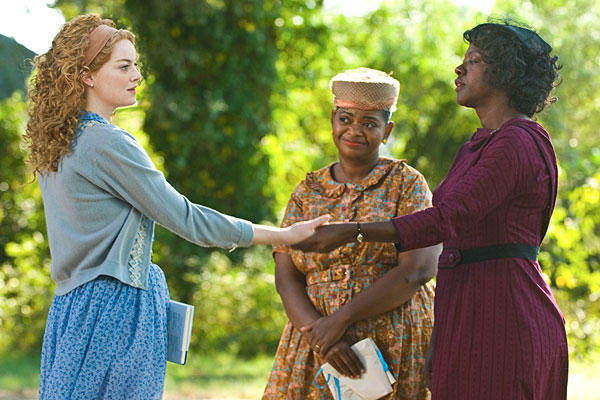Review: The Help
Late-summer Civil Rights dramas don’t come around much. In fact, late-summer dramas don’t come around much period, but “The Help” has just the right pinches of humor and bright colors to keep it from becoming a weighty affair more suited for the winter awards contenders. Don’t assume, however, that come the turn of seasons that anyone will have forgotten “The Help” come awards time.
Tate Taylor adapts and directs Kathryn Stockett’s best-selling novel about African-American maids living in Jackson, Miss. in the Jim Crow era. Viola Davis plays Aibileen, a woman who has been raising the children of wealthy Southern white families for decades. When college grad Eugenia “Skeeter” Phelan (Emma Stone) returns home with aspirations of becoming a journalist, she tries to convince Aibileen and fellow maid Minnie (Octavia Spencer) to tell their stories in hopes of getting their perspective heard. Although the women fear their identities being discovered, the prejudicial attitudes of Miss Hilly Holbrook (Bryce Dallas Howard) and her initiative to force homes with maids to provide a separate bathroom for The Help provokes them to courageously speak up.
“The Help” puts out a massive ensemble effort glowing with talent. Never has a female-dominated cast of this size given such strong performances across the board. Aibileen provides the narrative voice, but Skeeter, Minnie and others each get their stories told in full depth and the supporting roles from the likes of Allison Janney as Skeeter’s mother and Sissy Spacek as Hilly’s mother are priceless.
If a standout has to be chosen for Oscar consideration, it has to be Davis. There’s that constant look in her eyes suggesting that she’s always carrying every single thing her character has ever been through into every scene. She’s penetratingly real; she is everyone’s mother. She also brings the film’s wide range of emotions, though the comedy would be Spencer’s forte.
Spencer, a long-time small-role character actor, follows Taylor from his first feature-length film “Pretty Ugly People.” She makes the film a true delight with a hold-nothing-back attitude. Minnie embodies some racial stereotypes, but the script gives her such incredible depth that we associate those things with who she truly is, not as a vehicle for humor.
Perhaps — oddly enough — too many characters feel multi-dimensional and “The Help” lacks a true focus for a film running nearly two and a half hours, but the acting is so sharp at all levels that it never feels boring or hollow. The characters and the many situations and problems they deal with feel unmistakably real, namely because those problems break the mold for Southern Civil Rights drama.
The film avoids being another example of how terrible things once were and how poorly blacks were treated. It asks us to feel sorry for everyone, not just the African-American characters and scratch our heads at how life was ever like that anywhere in this country. Ultimately, “The Help” tells a story of courage in one of its unlikeliest forms — telling the truth, making sure all side are heard. It uses such a diverse tool set of characters to get that point across.
Taylor’s much more concerned about working with these actresses to create compelling portraits of characters and relationships in a place and time full of unique issues than he is with creating gripping drama. Considering the film is no less poignant and maybe all the more likable for it, he made the right choice.
—
4.5/5 Stars
—
- Directed by Tate Taylor
- Written by Tate Taylor, Kathryn Stockett (novel)
- Starring: Viola Davis, Emma Stone, Octavia Spencer, Bryce Dallas Howard





0 Comments
You can be the first one to leave a comment.